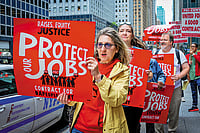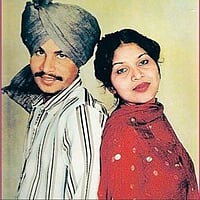It has been four years, and 13 days since we realised that we are not humans but aliens in a country. A non-resident alien. It sounded funny in the beginning but slowly the impact of being an outsider, a foreigner and, to be more precise, alien in a country dawned upon us. I know alien is a technical term but words have cultural meanings, and it was not Bollywood but Hollywood which made this image of aliens as someone who is not from the earth, someone from space or other planets. Though immigrants in the US are not from outer space but they are identified as aliens in the so-called oldest (modern) democracy.
An alien lives under the scourge of documentation and rules. It was at the time of filing taxes when we got to know that we were non-resident aliens. We laughed but as we started filing the taxes. the humour changed to despair. In the next years of our lives, the despair tuned into depression and, during the peaks of Covid-19, devastation. It is not easy to live in the US as a foreigner. You live every day thinking about documents. The visa rules are complicated. Take, for example, the fact that this is one of the countries in the world where the spouse of a student cannot work. In most of the Western world, if you are a student for more than one year, your spouse can work. Not in the US. That is just the tip of the iceberg. As a student, you pay taxes, both federal and state. You cannot work outside the university. It is illegal in most cases. Medical insurance is exceptionally expensive and almost mandatory because without insurance it is impossible to live. Some visas require you to have a medical insurance.
When we came to this country, my wife was pregnant. Then, three people had to survive on a meagre scholarship. Like millions of Third Worlders, we also came for a better future and realised the difficulties of living in the First world. We always had a rosy picture of the US, its fairness, the opportunities they provide. Agreeing that all these virtues exist in this country, I would like to underline that they are not for everyone.
Despite all the odds, we found mostly good Americans, always willing to help us. As we lived in the university zone, the people we met knew the problems we faced, the issues we had and tried to support us whenever needed. In the beginning, we were enthusiastic and mingled with everyone. We joked about being aliens with our friends and told them: “You are human. We are alien.” We laughed it out. Some professors blamed Donald Trump for all the problems of immigrants. At times, I intervened and said, ‘It is not Trump, it is the system that is against immigrants in this country made of immigrants.’ They agreed to the latter part. I kept my ‘argumentative Indian’ self in check. After all, we were in their country.
Slowly, we met students and common people from other countries. When we became friends, the issue of visas always came up in our conversations. The social science students are at a disadvantage as they only get a year to stay, get trained and find a job. If you are STEM (science, technology, engineering, math) you get three years. As we learnt new things, our feeling of enthusiasm gave way to some sort of estrangement. I started talking about going back to India. My wife was adamant that US is the place where we surely get the best. She asked me not to think too much. Maybe you are homesick, go and meet some Indians, was her suggestion. Indians are everywhere and, in no time, we met some wonderful Indian families. Some became citizens in the 70’s, some were in the process, and some of them were still thinking. Software engineers, doctors, engineers, professors anyone who had been a student in this country sympathised with us. I wanted to talk about my feelings possibly looking for justifications on why I was feeling estranged. Most of them responded saying “It happens. It is just a phase. You’ll be fine.” For most of them, the weekend hangouts revolved around getting a green card, buying a new home either in the US or in India. If not, then switching jobs and talk of how complicated the visa system is. Within a few months, I was overwhelmed with procedural information about Green Cards and H1B visas. After a while, I stopped going to the weekend hangouts with Indian families.
I was all alone at that point of time, mulling over my decision to come to this country with my wife as a student. I was not able to identify with anyone in this country. The clean air, roads without the noise of traffic, the malls - all started to annoy me. I thought I was depressed but it was not depression said my doctor who charged me 50 dollars, despite the medical insurance. He said ‘Maybe you are lonely. Disoriented.’ I was neither lonely nor disoriented. I was alienated.
The Merriam-Webster Dictionary tells us that alienation is feeling withdrawn or separated from others or from society. The alienation theory of Karl Marx (according to Wikipedia) is the estrangement of people from aspects of their human nature as a consequence of the division of labour and living in a society of stratified social classes. I had never been a fan of Marx but somehow this sounded right. I was a labourer at home- the househusband who could not work because he was not allowed due to visa rules. We lived in a society of stratified social classes: US citizens (both poor and rich), Indians (mostly rich), other immigrants (struggling but never talking about the struggle, fearing the breaking of the ‘American Dream’).
I had dreams but no ‘American Dream’ as such. I was not doing badly back in my country but circumstances put me in the US. I expected better for sure. At least the same as Europe. I wanted to be considered a human not alien. It might sound exaggerated but being addressed as an alien in documents is not fun. It makes me cringe now whenever I file taxes. It alienates me from this great country where rules are different for different nationalities. A melting pot where some people are destined to melt more than others. At the end people only remember the metaphor of melting pot and forget what goes inside that pot. Who gets melted inside? For one dream we sacrifice years, our real feelings, we become aliens to ourselves just to become a human, a U.S citizen.
(This appeared in the print edition as "Feeling Alien")
(Views expressed are personal)
Jey Sushil is the author of the Hindi novel House Husband ki Diary


























